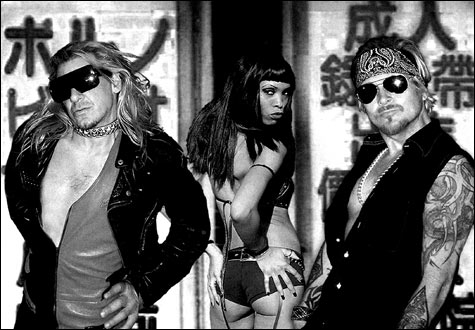
AMERICAN IDOLATRY “There’s no difference between Jesus Christ, Santa Claus, and the Devil. To me, they’re just images, just characters,” says Groovie Mann (left, with Pepper Somerset and Buzz McCoy). |
Subcultures all need their touchstones: entities that over time — for their hand in defining the æsthetic, or taking up the mantle of time-honored traditions — assume the stature of full-fledged institutions. In the late ’80s and ’90s, Tiger Beat bubblegum had New Kids on the Block, tabla drumming had Aloke Dutta, and goth-industrial dance had (among others) My Life with the Thrill Kill Kult.
“It was me and Buzz, and the other people involved were friends of ours, so it was like a cult of bartenders and club people that were, say, non-star types,” TKK’s Groovie Mann explains about the group’s early years as he sits on a fire escape somewhere in Los Angeles. “It was more about people being who they really are instead of showcasing their egos or personality.”
Groovie goes on, “I’m a performer. I went out seven nights a week, got drunk and danced to the Vibrators and the Sex Pistols and all that. Somebody asked me to sing in their band and that’s how I went after it. Don’t say I’m a singer. I didn’t start out being, like, ‘I’m a singer and I’m looking for a band.’ ”
Matter of fact, the TKK project wasn’t even supposed to be a band. When Groovie (who functions as a kind of ringmaster in TKK and, uh, actually does sing quite a bit) met Buzz McCoy (who pens music, plays keyboards, produces, tour-manages, books shows, and occasionally sleeps) in Chicago in ’87, they set to work collaborating on a horror film. Somehow, the importance of the project was eclipsed by its soundtrack.
“It [the circumstances of the band’s formation] was one of those moments that no one can really understand until the record company turns it into some kind of hype,” says Groovie, who claims that someday they’ll get around to finishing the TKK movie. If they don’t, we shan’t be wanting for hedonism, Satan, drugs, and disco as seen through TKK’s ominous looking glass. For two decades, our supplies of throbbing backbeats, Groovie’s slithering encouragements to get down with our bad selves, and samples of B-movie dialogue repeating like incantations have been steadily expanding.
Although the urge to churn out a replica of their most successful record once every two years is too seductive for many veterans to resist, TKK have toyed with techno, tossed in horns, and dabbled in surf rock. But for this, the 20th-anniversary tour, their set will comprise their tenure on Wax Trax Records — tunes from I See Good Spirits and I See Bad Spirits (1989), Confessions of a Knife (1990), and Sexplosion (1991). For consistency, the stage spectacle will be compacted to its original format: two singers and two keyboards (no back-up from singer/dancer Pepper Somerset this trip). What’s different from the Sexplosion tour in ’91: no one is scheduled to simulate fellatio of a faux Jesus during the performance.
“It’s a celebration of 20 years,” says Buzz McCoy, who also resides in Los Angeles. “We thought we’d do stuff that people first fell in love with us for.”